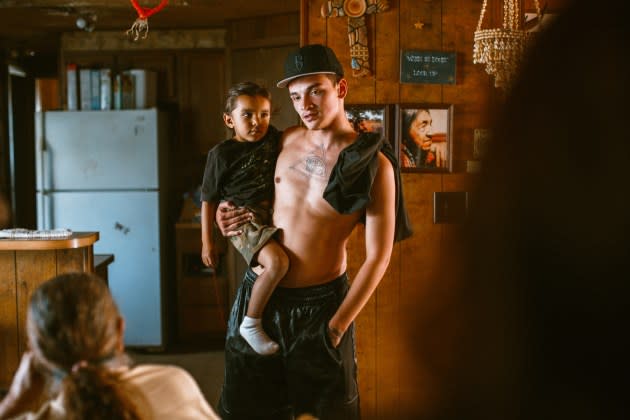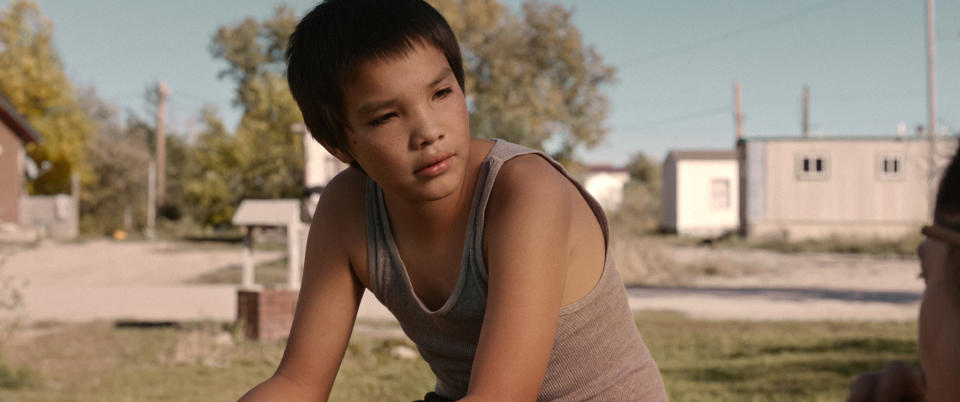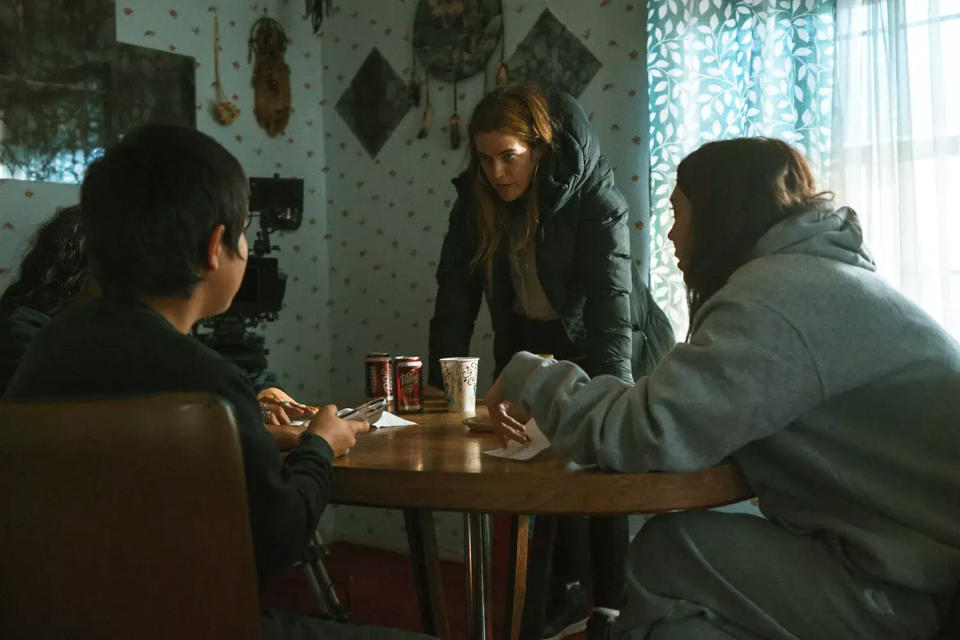Riley Keough’s ‘War Pony’ Takes a Tough, Tender Look at Reservation Life
- Oops!Something went wrong.Please try again later.
- Oops!Something went wrong.Please try again later.

You’ve seen it a million times in a million different movies: A dude is cruising in his neighborhood, bumping bass-heavy tunes out of his car and dragging on a cigarette. His baseball cap is tilted, the heart tattoo inked on his cheek looks like a birthmark, and thanks to the camera placement, we’re riding shotgun right next to him. His buddy in the basketball jersey is in the back seat, conked out. They’re driving through one of the residential areas on the Pine Ridge Reservation in South Dakota, home to a large Oglala Lakota population. As the shot pans, we catch a glimpse out his rear window of… a guy riding past him on a horse. Then another. They gallop a little bit in front of him, kicking up dust from the road. The guy just exhales smoke, head slightly nodding to the music. His whole demeanor seems to say: Whatever, man. Just another day on the rez.
To viewers, however, it’s a bit of jolt, as well as a great example of the storytelling methodology behind War Pony. The directorial debut of Daisy Jones & the Six star Riley Keough and producer Gina Gammell, this drama about two young Native men navigating an environment of drugs, violence, crime, and economic hardship treads on some familiar ground. This is a coming-of-age movie that doubles down on the rough terrain of growing up, even if one of the protagonists is already in his twenties. It swerves around some clichés, and crashes head-first into others. But it’s also a movie that wants to show you a community, and one subset of a larger Indigenous American culture that’s only recently begun to get the screen time it deserves. And the film’s ability to take those genre beats and occasionally tweak them, twist them, and add something regionally specific to them keeps this from being just another tale of desperate decisions and tough times.
More from Rolling Stone
'The Real Wild West': The Dark, Bloody History of How the West Was Won
Sofia Coppola Tells Elvis' Wife's Side of Story in 'Priscilla'
Riley Keough to Pay Priscilla Presley, Ending Legal Battle Over Family Trust
The guy in the car? That’s Bill (Jojo Bapteise Whiting). He’s got two sons, from two women who want nothing to do with him. And thanks to a large poodle he’s come across, Bill’s also got a new hustle: breeding purebred puppies for a big payout. He just needs some seed money, which makes his encounter with an older white guy (Jesse Schmockel) on the side of the road that much more fortuitous. The man owns a turkey processing farm. He needs a ride back to his house, since his tire’s blown. He’ll also pay Bill to drive the young Native woman in the car back to the reservation. If he keeps this woman’s presence on the down-low, the entrepreneur can hook Bill up with a factory job and some extra work around his estate.
There’s also a gaggle of kids running around, lighting firecrackers and ripping off locals and just generally wreaking havoc. One of them, Matho (LaDainian Crazy Thunder), has found some of his usually M.I.A. dad’s meth stash and convinces his friends to help him sell it. Once this business transaction is discovered, his father kicks him out of the house. Matho ends up at an auntie’s house, where a group of other wayward teens are staying. Her one big rule: “Keep your drama out of my teepee.” Soon, he’s dealing drugs at school and putting that mandate to the test.

These stories intersect briefly at War Pony‘s beginning, then proceed on parallel paths until they inevitably start to wind back toward each other near the end. Along the way, we see both self-empowerment and self-destruction, twentysomething manchildren and youngsters forced to grow up too quick, natural rural beauty and overwrought symbolism. (Why yes, a mystical buffalo does show up every so often, gazing silently and suggesting some spiritual connection to the past.) Racism rears its ugly head in blatant, casual, and unthinking forms; there are few shots more quietly indicting than Bill working his boss’s Halloween party and observing an oblivious Caucasian in full Native costume, complete with face paint.
The origin story is that Keough struck up a friendship with Bill Reddy and Franklin Sioux Bob, two nonprofessional Lakota performers on the set of American Honey. She and her longtime buddy Gammell would regularly visit Pine Ridge, where they were told “war stories” about the men growing up and getting into trouble on the reservation. The four of them then began working on a script together, weaving Bill and Matho’s narratives — along with the good, the bad, and the nurturing aspects of the Indigenous community at large — into something like a mural. During War Pony‘s tour on the festival circuit (it won the Camera d’Or for Best First Feature at Cannes last year), Keough would continually point out that this was a collaborative effort, which risked sounding defensive over possible handwringing regarding who gets to tell these stories and why. The uneasiness on both sides of the argument is understandable, and it’s a debate that will rage on long past the film’s release and reception.

Yet when you see the movie, there’s no sense that it’s the work of dilettantes or cultural tourists. There’s a lived experience pulsing at the center of this slice-of-life tale, which helps guide it over some of the more generic elements and weaker patches, especially when things threaten to detour directly into poverty-porn and/or Amerindie miserablism territory. Ditto the raw, unfiltered performances from a largely first-time cast, notably Whiting and Crazy Thunder — the former can turn on the ditzy himbo charm or turn dark on a dime, while the latter’s natural stillness in front of a camera suggests depths normally found in actors two, three times his age.
The tragic elements of life on this patch of land, in this part of the country, are given their due. So are the funny bits as well, even if its strain of stoner-comedy feels muted enough to be near-invisible. There’s also a climactic bit set to Redbone’s heavy-in-recent-rotation “Come and Get Your Love” that feels like too broad a swing, until you suddenly realize what longstanding holiday is being roasted and how a reversal of fortune can be a karmic bitch in more ways than one. Then again, War Pony has a way of slipping those sublime moments in between the stock ones before you fully catch on to the switch. It doesn’t want to be the last word on the Native experience. It just wants its own words to be heard.
Best of Rolling Stone

